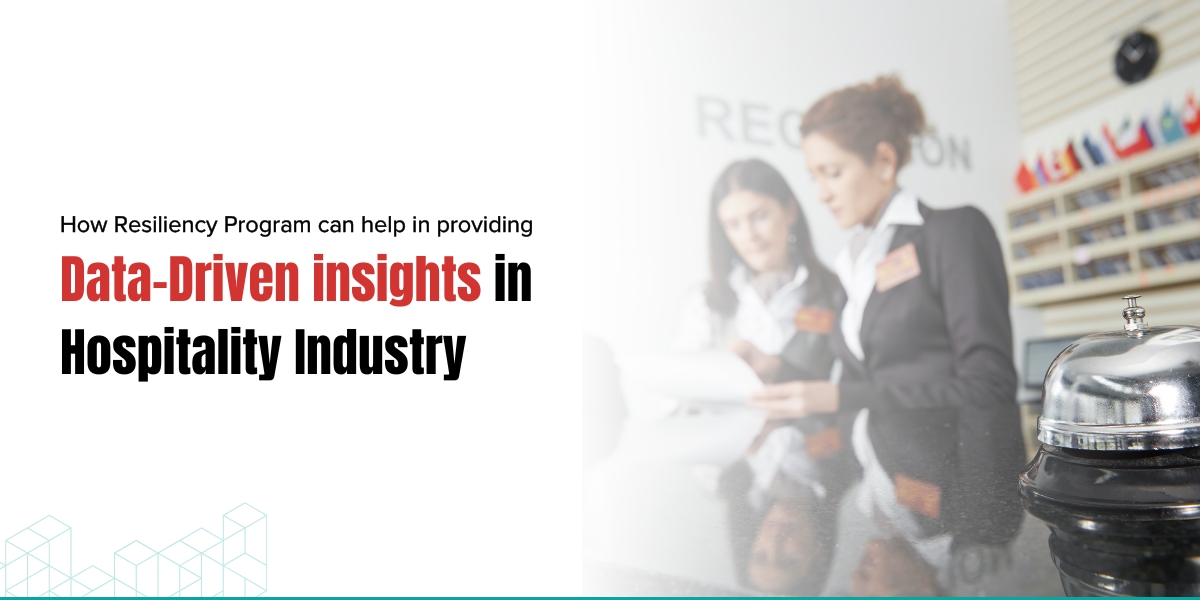
How Resiliency can help in providing Data-Driven insights in Hospitality Industry
Data-driven insights are now essential for obtaining a competitive edge in the quickly changing hotel sector. Leveraging data is necessary for making well-informed decisions, from improving customer experiences to streamlining processes. Nevertheless, there are frequent obstacles to deriving valuable insights from data. Here's when resilience becomes useful.
By cultivating a resilient mindset, the hotel sector may overcome these obstacles and reap the full benefits of data-driven insights.
Understanding Resilience in the Context of Data
The ability of a corporation or its systems to carry on with business as usual in the event of unforeseen disruptions that directly affect the availability of data is known as data resilience. Cyberattacks, power outages, natural disasters, and hardware or software malfunctions are a few instances of these occurrences.
Data resilience guards against illegal access to data and guarantees that users may always access vital information and related resources.
The Role of Resilient Data Infrastructure
Data resilience is important because it protects against potential risks and difficulties that could harm the organization's profitability and reputation while also supporting the business's essential operations, such as decision-making and customer service.
Data Collection and Integration
In the hotel business, data is essential to pinpointing problem areas and enhancing the visitor experience. With the help of technology, hotels may gather and analyze data in real time, enabling them to make well-informed decisions that may affect their bottom line. Data integration begins at the central reservations system (CRS).
If any part of the business is flowing through a CRS, the primary goal should be to ensure that the CRS and the PMS integrate seamlessly. To collect data in a resilient, scalable, and flexible manner, technology that can handle diversity must be used.
Data Quality and Consistency
It is important to act quickly and decisively when making judgments in the fast-paced hospitality industry. The driving force behind this demand is data-driven tactics. Hotels can create more successful marketing campaigns and have a deeper understanding of their clientele with high-quality data.
Additionally, high-quality data can assist hotels in more accurately evaluating their operations and pinpointing possible areas for development. Hotels can learn more about what their customers want by reading through their reviews. It increases client loyalty and trust, maintains quality control, and simplifies processes.
It makes employee growth and training more accessible and gives businesses a competitive edge. By utilizing high-quality data, hotel managers may increase the accuracy of their forecasts regarding market trends, guest preferences, and operational requirements. This results in improved decisions across a range of areas, from deciding on the proper staffing levels to creating marketing campaigns catered to particular groups.
Data Security and Privacy
Hotels receive personal and financial information from their guests. Building long-term relationships with guests requires fostering trust and confidence, which can only be achieved by implementing robust data security measures. A hotel's dedication to safeguarding its customers' privacy is reflected in its commitment to data security.
It guarantees the safety of cardholders, merchants, and all those involved in malicious assaults of any kind.
Predictive Analytics and Machine Learning
The hospitality sector stands to gain a great deal from the application of machine learning and predictive analytics technologies. These instruments can predict demand, enhance pricing, and customize visitor experiences.
Real-time Data Processing
In the hotel industry, choices must frequently be made quickly; therefore, timeliness is essential. Real-time data processing capabilities enable immediate analysis and faster reaction times. This is especially important for managing staffing, inventory, and customers in a dynamic setting.
Scenario Planning and Simulation
The hotel sector is vulnerable to unforeseen events like natural disasters and economic downturns. Scenario planning and simulation approaches are included in resilient analytical frameworks in order to predict and lessen the impact of such catastrophes. Businesses can create efficient methods to manage uncertainties by simulating various situations.
Adaptive Analytical Frameworks
The next stage is analysis after the data has been gathered and secured. To yield pertinent findings, analytical frameworks in the dynamic hospitality sector must be adaptable and agile. In this sense, resilience refers to the capacity to quickly change course and modify analytical models in response to evolving conditions.
For more information, book a corporate mindfulness program and learn in-depth how to overcome your consistent obstacles.